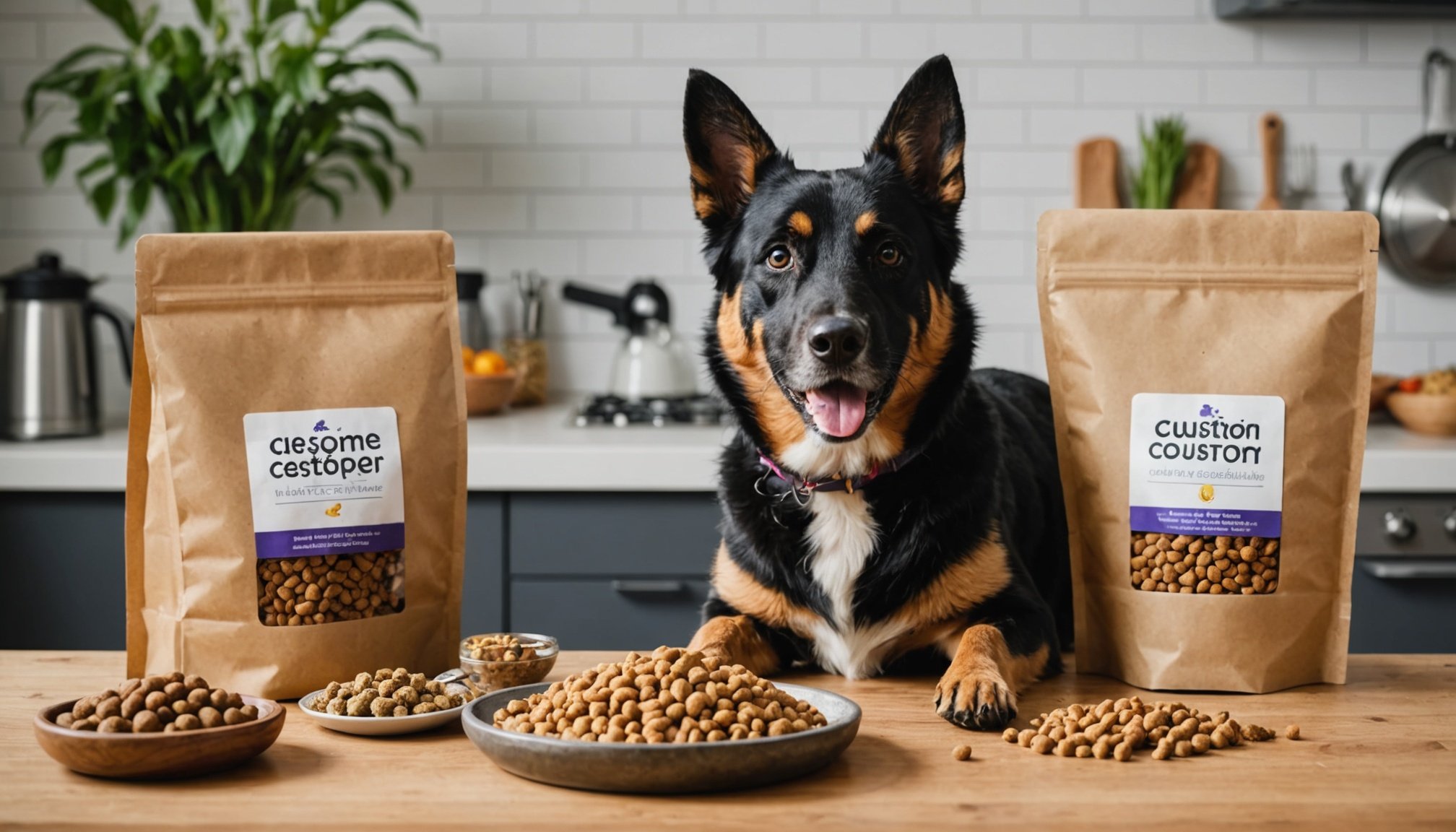Market Overview of Custom Pet Food Subscription Services
The pet food industry has witnessed significant growth, especially in the niche of subscription services. Currently, the market is expanding, driven by increasing demand for personalised pet diets and convenience. In the UK, this sector shows promising growth statistics with a substantial market size, signalling lucrative opportunities for new entrants and existing businesses alike.
Subscription services in the pet food domain are gaining momentum due to their tailored offerings and the convenience they provide to pet owners. Key players are competing vigorously, creating a rich competitive landscape. This competition includes well-established brands and innovative newcomers meeting consumer demands with diverse offerings.
Have you seen this : Revolutionizing uk dining: a comprehensive guide to adopting sustainable seafood practices for restaurant chains
Emerging market trends indicate a shift towards more health-oriented and customised pet food options. Consumers are increasingly prioritising quality and the specific dietary needs of their pets, which fuels the demand for custom pet food subscription services. As consumer demands evolve, there is a notable trend towards sustainability and ethical sourcing within the industry, reflecting broader societal shifts in values.
To capture this growing market, businesses need to stay abreast of these trends, continually innovate their products, and be adaptable to changing consumer preferences. Understanding these dynamics is crucial for achieving success in the pet food subscription market.
In parallel : Innovative approaches to integrating biodegradable materials in uk automotive manufacturing
Understanding Consumer Preferences
In the evolving pet food industry, understanding the dynamics of pet owners is paramount. Diving into buying behaviour reveals that pet owners are increasingly driven by a desire for customization. They often seek tailored diets that cater specifically to their pets’ unique needs. This push towards personalization is not solely aesthetic; it is deeply rooted in health considerations. Various factors define these choices, with a heightened focus on ingredients and nutritional profiles.
Pet owners today are diverse, and their demographics span a wide age and income range. They are more informed and passionate about their pets’ well-being, fuelling the demand for bespoke nutritious options. As purchasing motivations evolve, customization remains a pivotal factor influencing decisions. Sustainability and ethical sourcing also play significant roles. Consumers are concerned not just with the quality of pet food but with how it impacts the environment and aligns with their values.
The trends in sustainability reflect broader societal shifts, with pet owners opting for brands that prioritise eco-friendly practices. Companies must adapt to these preferences by offering transparent sourcing information and sustainable packaging. Discerning consumer expectations will ultimately shape the market’s trajectory, impacting subscription services strategies moving forward.
Service Models for Custom Pet Food Subscription
Exploring diverse service models in the custom pet food subscription market can provide consumers with flexible and convenient options. Among the most popular are monthly and bi-weekly subscription models, catering to pet owners who prefer regular and predictable deliveries. These models allow for seamless planning, helping to maintain a continuous supply of custom pet food tailored to individual pet needs.
Various Subscription Models
Implementing various subscription models can meet the differentiated needs of pet owners. For example, a monthly plan may appeal to those with standard dietary requirements, while bi-weekly plans can cater to pets with more specific or changing dietary needs.
Flexibility in Delivery Options
Offering flexibility in delivery options enhances customer satisfaction and retention. Options can include scheduled deliveries, rush orders for unforeseen circumstances, or customer-defined intervals to synchronize with consumption rates.
Pricing Strategies
Competitive pricing strategies are critical in this market’s expansion. Pet food subscription companies must consider production costs, market demand, and customer willingness to pay. Offering tiered pricing allows businesses to appeal to a broader customer base with varying budgets.
By adopting diverse service models with flexible delivery and pricing options, businesses in the pet food industry can effectively meet consumer preferences and enhance subscription service appeal.
Legal Considerations for Custom Pet Food Services
Navigating the landscape of the pet food industry involves understanding crucial regulations surrounding pet food production and sales in the UK. Compliance with these legal requirements ensures not only the safety of the pets consuming the products but also the business’s credibility and trustworthiness. UK regulations necessitate adherence to specific food safety standards, which include guidelines on the permissible ingredients, nutritional content, and manufacturing processes.
Moreover, it’s essential for businesses to correctly implement labeling requirements. Transparency in ingredient lists and nutritional information is mandated, enabling pet owners to make informed decisions regarding their pets’ dietary intake. Non-compliance can lead to legal disputes, thereby affecting the company’s reputation and market standing.
Another facet to consider is the legal framework governing subscription service agreements. Companies must ensure that their contracts clearly outline customer rights, including cancellation policies and data protection practices. Structuring these agreements transparently minimizes potential legal conflicts and enhances consumer trust.
Compliance with regulations not only safeguards your business against potential legal issues but also strengthens your brand’s integrity in the eyes of ethical and informed consumers, ultimately contributing to long-term success in the competitive pet food market.
Marketing Strategies for Success
Developing effective marketing strategies is crucial for gaining a competitive edge in the custom pet food subscription market. Leveraging digital marketing techniques can significantly enhance visibility and reach. For instance, search engine optimization (SEO) tailored specifically to pet food-related keywords can drive targeted traffic to your subscription services.
Social media offers an engaging platform to build brand awareness. Platforms like Instagram and Facebook allow businesses to connect with pet owners through visually compelling content and storytelling. Collaborating with influencers in the pet industry can amplify brand reach, as these influencers often have dedicated followings who trust their recommendations.
Another critical component is customer engagement. Loyalty programs incentivize repeat purchases and increase customer retention by rewarding subscribers for consistent engagement. Personalized communication – such as tailored emails or newsletters – can enhance the customer experience, fostering stronger connections and brand loyalty.
Additionally, utilizing data analytics can refine marketing strategies by identifying consumer behaviour patterns and preferences. This information helps tailor campaigns effectively to meet the needs of your target audience. By integrating these strategies, businesses in the pet food subscription market can enhance customer acquisition and retention, paving the way for sustained growth.
Insights on Pet Nutrition and Customization Options
Understanding pet nutrition is crucial when creating effective pet food subscription services. Essential nutrients such as proteins, fats, carbohydrates, vitamins, and minerals vary across different pets and breeds, demanding a tailored approach. This customisation can significantly contribute to the overall health and well-being of the pet.
Customization Options
Customization options leverage knowledge of a pet’s individual dietary needs, allowing for personalisation of ingredients to address specific health requirements. This approach often includes unique blends tailored for allergies or specific health conditions, ensuring nutritional adequacy while supporting optimal health outcomes.
Pet owners are increasingly seeking products that incorporate veterinary recommendations. This involves using formulas that vets endorse or actively participate in developing, adding an extra layer of trust and ensuring that dietary offerings align with pet health needs.
In practical terms, businesses can enhance their product lines by integrating these recommendations into their offerings. By doing so, they meet the evolving demands of conscientious pet owners who prioritise informed choices. These strategic efforts not only accommodate specific dietary needs but also establish a competitive advantage, ultimately elevating the brand’s reputation in the pet food industry.
Case Studies and Success Stories
Exploring success stories and case studies in the UK reveals pivotal lessons for aspiring businesses in the custom pet food subscription market. One noteworthy example is a company that leveraged customer feedback to refine its product offerings, resulting in a significant boost in customer satisfaction and growth. By soliciting direct input from subscribers, they were able to tailor their services to meet specific dietary needs and preferences, showcasing the vital role of ingredient customization.
Another success tale is of a company that excelled in utilizing digital marketing and social media to build extensive brand awareness. Engaging storytelling and compelling visuals helped them connect with pet owners on platforms like Instagram, amplifying their reach and fostering community engagement. Collaborations with pet influencers played a crucial role in this outreach strategy.
These case studies underscore the importance of certain best practices within the industry. Key strategies that stand out include maintaining transparency regarding pet nutrition and being highly responsive to consumer trends. Companies that actively incorporate vet recommendations into their offerings often gain a competitive edge, ensuring products align with the latest health standards and expert advice. Through these insights, businesses can refine their approaches to achieve success.




